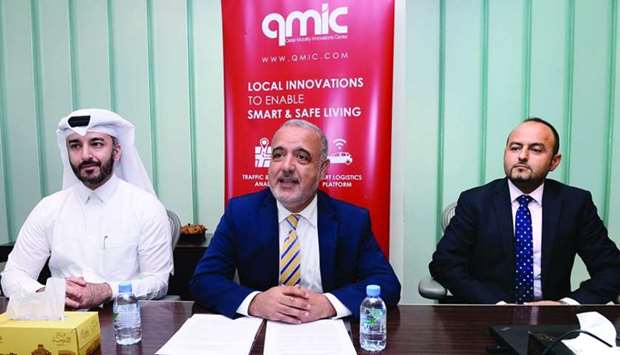The average number of hours spent by commuters in traffic jams in 2018 has fallen by 10% compared to 2016, according to a report released by Qatar Mobility Innovations Centre (Qmic) Monday.
Over 1.5bn records of data, coming from major road segments in Qatar, were collected by Qmic’s Masarak platform to prepare the Qatar Traffic Report (QTR) for 2018.
The average number of hours spent due to congestion was 98 per commuter in 2018, 10% less than the 109 in 2016. This indicates that road projects completed by Ashghal in 2018 had a positive impact on traffic flow.
QTR used the concept of Masarak Congestion Index (indicates average reduction in speed due to congestion) and the Travel Time Index (indicates the increase in travel time due to congestion) to assess the level of road congestion. In addition, using publicly available statistics about the labour force in Qatar together with Qmic’s mobility and congestion data, Qmic has built a model to quantify the economic impact of traffic congestion in Qatar.
Another finding of the report is that the economic cost (lost productivity) of congestion in 2018 is estimated to be between QR5.5bn and 6.9bn equivalent to the levels forecast for previous years. This translates to a loss of about 0.9-1.1% of the GDP in 2018. This is equivalent to the level economic losses observed in other countries.
The report finds that February, March, and November 2018 were the most congested months in the year with a congestion index of 28.8%. The highest congestion period during the work days is the evening peak (around 6-7pm) when the average congestion index is 33.8%. In the morning peak hours of work days, Monday had the highest congestion index of 33% and Thursdays had the lowest congestion index of 31%.
This year’s edition of the report takes a detailed look at the traffic status in Qatar. It provides unique insights about traffic congestion and movement in Qatar throughout the year, across major road segments and during different periods of the day.
Dr Adnan Abu-Dayya, executive director (CEO) of QMIC, said: “Over the years, we spent significant effort to build a comprehensive data collection network and the associated data intelligence that allowed us to build a valuable data bank about traffic and mobility behaviour in Qatar. We are happy to use this strategic platform to support decision makers in Qatar through the Qatar. In the next few months, we look forward to use our data bank and intelligence to shed insights about driving behaviour and road safety issues on Qatar’s roads.”
QTR is considered the only report of its kind to analyse data acquired from multiple sources and benchmarked against an existing and rich bank of information accumulated over the years. It can serve as an important tool for stakeholders in the fields of transportation, road safety, smart cities and urban planning, as it provides many useful insights into the state of traffic in Qatar.
QTR is one of the key outputs of the Masarak System which was fully developed and deployed by Qmic. Masarak represents a comprehensive platform and integrated suite of services serving the areas of Intelligent Transport, Road Safety, and Smart Logistics/Telematics.
The average number of hours spent due to congestion was 98 per commuter in 2018, 10% less than the 109 in 2016. This indicates that road projects completed by Ashghal in 2018 had a positive impact on traffic flow.
QTR used the concept of Masarak Congestion Index (indicates average reduction in speed due to congestion) and the Travel Time Index (indicates the increase in travel time due to congestion) to assess the level of road congestion. In addition, using publicly available statistics about the labour force in Qatar together with Qmic’s mobility and congestion data, Qmic has built a model to quantify the economic impact of traffic congestion in Qatar.
Another finding of the report is that the economic cost (lost productivity) of congestion in 2018 is estimated to be between QR5.5bn and 6.9bn equivalent to the levels forecast for previous years. This translates to a loss of about 0.9-1.1% of the GDP in 2018. This is equivalent to the level economic losses observed in other countries.
The report finds that February, March, and November 2018 were the most congested months in the year with a congestion index of 28.8%. The highest congestion period during the work days is the evening peak (around 6-7pm) when the average congestion index is 33.8%. In the morning peak hours of work days, Monday had the highest congestion index of 33% and Thursdays had the lowest congestion index of 31%.
This year’s edition of the report takes a detailed look at the traffic status in Qatar. It provides unique insights about traffic congestion and movement in Qatar throughout the year, across major road segments and during different periods of the day.
Dr Adnan Abu-Dayya, executive director (CEO) of QMIC, said: “Over the years, we spent significant effort to build a comprehensive data collection network and the associated data intelligence that allowed us to build a valuable data bank about traffic and mobility behaviour in Qatar. We are happy to use this strategic platform to support decision makers in Qatar through the Qatar. In the next few months, we look forward to use our data bank and intelligence to shed insights about driving behaviour and road safety issues on Qatar’s roads.”
QTR is considered the only report of its kind to analyse data acquired from multiple sources and benchmarked against an existing and rich bank of information accumulated over the years. It can serve as an important tool for stakeholders in the fields of transportation, road safety, smart cities and urban planning, as it provides many useful insights into the state of traffic in Qatar.
QTR is one of the key outputs of the Masarak System which was fully developed and deployed by Qmic. Masarak represents a comprehensive platform and integrated suite of services serving the areas of Intelligent Transport, Road Safety, and Smart Logistics/Telematics.

